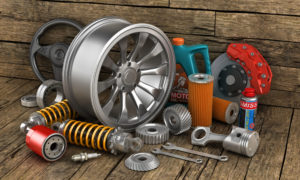Tampa Defective Cars and Auto Parts Lawyer
As vehicle manufacturers strive to streamline the production process and improve their bottom-line, sometimes safety suffers due to using inferior or defective parts in their vehicles. Auto manufacturers have a duty to ensure their cars are as safe as possible. So, if you or a loved one is injured in an accident that results from a defective vehicle component. In that case, you may be able to seek compensation for your injuries from the manufacturer.

What are the Most Commonly Defective Vehicle Parts?
According to the NHTSA, there are two types of defective parts: safety-related and defects that are not safety-related. When the defect in a product is safety-related, the manufacturer will issue a recall notice to the public to try to get as many of the vehicles into a shop to get the defective product replaced at no cost to the car owner.
Common Examples of Safety-Related Vehicle Defects
- Steering components that break, causing complete loss of control of the vehicle
- Fuel system components that leak or pose serious fire hazards
- Wheels that crack or break resulting in loss of control
- Malfunctioning windshield wiper components
- Wiring system defects that cause fires or loss of lights
Common Examples of Vehicle Defects Not Safety-Related
- Non-essential components, such as air conditioners or radios, malfunctioning
- Poor quality paint
- Blemishes
- Excessive fuel or oil consumption
What is the Difference Between Product Liability and an Accident?
A vehicle accident may be caused by a defective product rather than human error while operating the vehicle. When determining who is at fault in an accident, it may be discovered that the accident was unavoidable due to a defective part of the car, such as brakes. If it is determined that vehicle defects caused the accident, the people injured in the accident may have a case against the manufacturer or installer of defective parts.
When you file a claim for an accident, you may end up filing against the other driver and a manufacturer, depending on the circumstances. However, Florida law has limitations on the damages that you can seek for a product liability claim if you are partially at fault for the accident. Your attorney will decide who to seek damages from once liability becomes clear.
What are the Types of Defective Vehicle Liability Claims?
There are two main categories of product liability claims involving motor vehicles: defectively manufactured vehicles or vehicle parts and vehicles with an unreasonably dangerous design. Defectively manufactured vehicles or vehicle parts may result from an error that occurred during the manufacturing process or a problem during shipping or sale. Cars with an unreasonably dangerous design did not incur errors during manufacturing, shipping, or sale. Instead, there is something inherently dangerous in the design. This may be discovered after the vehicle or vehicle part has been on the market for some time.
Who May be Found Liable for Defective Cars?
If you have a case involving a defective or dangerous vehicle or a vehicle part and decide to file a lawsuit, identify potential defendants following the distribution chain. The chain of distribution is the path that the car or part takes from manufacturer to consumer. A chain of distribution may include the manufacturer, car dealership, supply shop, shipping company, or other middlemen.
In the case of a defective part, you should sue both the vehicle manufacturer and the manufacturer of the part if they are separate companies unless you bought the defective part separately. Even if the vehicle was purchased, a used car dealer may still be liable, depending on the case’s state and specific circumstances.
How can I Prove Product Liability?
Liability is proven after a thorough investigation that collects all available evidence. Evidence of liability may include the defective auto part or other parts that were manufactured in the same batch, a manufacturer’s correspondence regarding a recall, eyewitness testimony, photos or video footage, and maintenance records. These will all assist in proving your case.
What Damages Can I Pursue in Florida?
The damages for which car accident victims can pursue compensation vary by state. Victims who have been seriously injured may be able to pursue damages including, but not limited to: medical expenses, pain and suffering, and lost wages.
Injuries vary based on the accident and symptoms may not be evident at first, so it is important to get a thorough medical examination. Medical expenses may include therapy, ambulance fees, doctors’ visits, home care, and medical accessories such as a wheelchair or heating pads. Pain and suffering encompass mental or physical distress and damage, such as anxiety or stress stemming from the accident. Lost wages include benefits and include lost earnings from time away from work resulting from the accident as well as a loss of future earning potential.
What is a Vehicle Recall?
A recall notice may be issued if it is determined that a component of a vehicle is defective. When a manufacturer issues a recall, consumers will be given the opportunity to replace the defective product free of charge. To check if your vehicle is under recall, you can visit the NHTSA recall site or the Florida Department of Agriculture’s product recall site.
Hire a Product Liability Attorney in Tampa
If you’ve been involved in an accident caused by a defective vehicle, you will need an experienced product liability attorney on your side. Manufacturers are sometimes very slow to issue recalls due to the high cost involved. Unfortunately, this means many people are injured in the delay of the process.
Darrigo & Diaz will fight for your rights and get the compensation you need for medical bills, repairs, pain and suffering, and more. Contact us at (813) 774-3341 for a complimentary, no-obligation consultation right over the phone. You can also contact us online with any questions you have.
